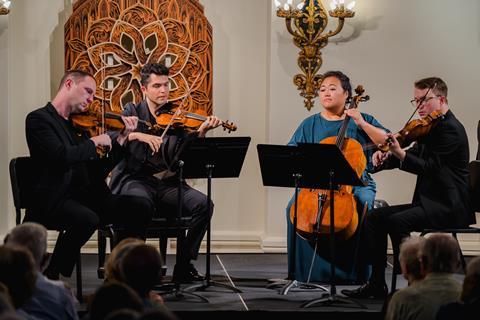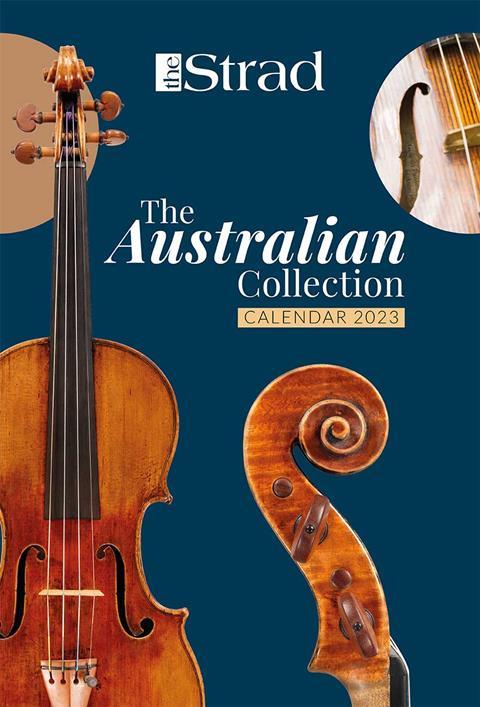Calidore Quartet violinist Jeffrey Myers outlines the highlights and challenges of performing these works, ahead of a Beethoven string quartet cycle at Music@Menlo

Discover more Featured Stories like this in The Strad Playing Hub
When did you first encounter the Beethoven string quartets?
As an individual, I had the great fortune of growing up in an incredible chamber music programme for young musicians called the Chamber Music Connection. It is located in Columbus, OH and is still inspiring young musicians today. We were so fortunate to work with local musicians as well as the top performing quartets that came through town. This is where I first had the opportunity to perform a few select movements from the op.18 quartets.
As I made my way into high school I attended the Aspen Music Festival and school where I became a keen concertgoer. I attended all of the concerts my schedule allowed for and especially all of the string quartet concerts on the calendar. This is where I saw the Emerson Quartet play the late quartets for the first time. What an experience! They performed on the stage at the tent at Aspen which is where most of the orchestral performances take place. Though there were only four people on stage, there was a palpable energy greater than a full symphony orchestra. After they reached the final chord of op.133 the entire audience was out of their seats. These concerts had a profound impact on my future and my full-blown obsession with the string quartet and more specifically the Beethoven quartets.
In performing the full cycle, which encompasses Beethoven in all periods of his life, can you elaborate on your journey in playing through the works?
In our past Beethoven cycles, our quartet followed the concert order set by the longest-running Beethoven Quartet series, the Slee Series in Buffalo, NY. This order presented a mix of early, middle, and late quartets in each performance, creating a diverse and captivating experience for the audience. However, this summer at Music@Menlo, we are embarking on presenting the cycle in chronological order. This approach provides a compelling insight into the musical life and evolution of Beethoven as a person and composer, allowing the audience to witness the progression and transformation of his artistry over time.
Read: ‘It’s a powerful experience to perform the cycle’: cellist Guy Johnston on Beethoven Cello Sonatas
Read: Book and sheet music review: Beethoven String Quartet op.131
Tell us about some of the challenges of performing and rehearsing the Beethoven string quartets
While studying op. 95 ‘Serioso’ with Earl Carlyss (long-time second violinist of the Juilliard Quartet), he warned our quartet of the difficulties of performing Beethoven string quartets. He said that no matter how many times the Juilliard Quartet performed the works, that it felt as if Beethoven had his thumb on your throat, and he never lets go. Amid a myriad of technical hurdles, the cycle demands a relentless focus like no other, beckoning the soul to conquer them with artistic determination.
What are you looking forward to most in performing the cycle? Do you have a favourite Beethoven string quartet?
As a performer, I am endlessly captivated by op.131, which stands as a beacon of artistic brilliance within the cycle. Embodying a kaleidoscope of emotions, each movement presents a unique journey that we, as a quartet, have the privilege to embark upon and share with our audience. The unconventional structure of seven interconnected movements challenges us to weave a seamless musical narrative, transcending traditional boundaries and pushing us to explore new horizons of expression. For me, this quartet encompasses everything that makes Beethoven, Beethoven.
The Calidore Quartet performs the cycle of Beethoven String Quartets at Music@Menlo. Find out more here: https://musicatmenlo.org/festival/quartet-cycle
Read: Session Report: The Calidore Quartet on recording Beethoven’s late quartets
Read: Live-streamed concert review: Calidore Quartet
Read more Featured Stories like this in The Strad Playing Hub
The number one source for playing and teaching books, guides, CDs, calendars and back issues of the magazine.
In The Best of Technique you’ll discover the top playing tips of the world’s leading string players and teachers. It’s packed full of exercises for students, plus examples from the standard repertoire to show you how to integrate the technique into your playing.
The Strad’s Masterclass series brings together the finest string players with some of the greatest string works ever written. Always one of our most popular sections, Masterclass has been an invaluable aid to aspiring soloists, chamber musicians and string teachers since the 1990s.
This year’s calendar celebrates the top instruments played by members of the Australian Chamber Orchestra, Melbourne Symphony, Australian String Quartet and some of the country’s greatest soloists.













































No comments yet